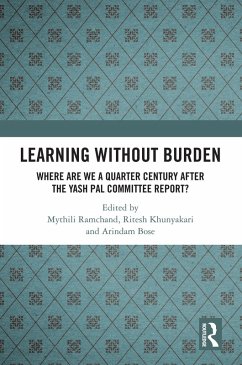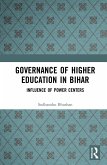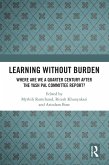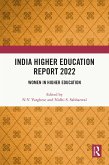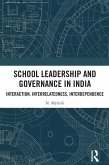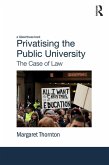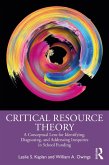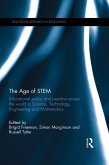Learning without Burden (eBook, PDF)
Where are We a Quarter Century after the Yash Pal Committee Report
Redaktion: Ramchand, Mythili; Bose, Arindam; Khunyakari, Ritesh
41,95 €
41,95 €
inkl. MwSt.
Sofort per Download lieferbar

21 °P sammeln
41,95 €
Als Download kaufen

41,95 €
inkl. MwSt.
Sofort per Download lieferbar

21 °P sammeln
Jetzt verschenken
Alle Infos zum eBook verschenken
41,95 €
inkl. MwSt.
Sofort per Download lieferbar
Alle Infos zum eBook verschenken

21 °P sammeln
Learning without Burden (eBook, PDF)
Where are We a Quarter Century after the Yash Pal Committee Report
Redaktion: Ramchand, Mythili; Bose, Arindam; Khunyakari, Ritesh
- Format: PDF
- Merkliste
- Auf die Merkliste
- Bewerten Bewerten
- Teilen
- Produkt teilen
- Produkterinnerung
- Produkterinnerung

Bitte loggen Sie sich zunächst in Ihr Kundenkonto ein oder registrieren Sie sich bei
bücher.de, um das eBook-Abo tolino select nutzen zu können.
Hier können Sie sich einloggen
Hier können Sie sich einloggen
Sie sind bereits eingeloggt. Klicken Sie auf 2. tolino select Abo, um fortzufahren.

Bitte loggen Sie sich zunächst in Ihr Kundenkonto ein oder registrieren Sie sich bei bücher.de, um das eBook-Abo tolino select nutzen zu können.
This book looks at education reforms, planning and policy through an exploration of the Yash Pal Committee Report (1993) in India, which made recommendations to improve the quality of learning while reducing cognitive burden on students.
- Geräte: PC
- ohne Kopierschutz
- eBook Hilfe
- Größe: 28.55MB
Andere Kunden interessierten sich auch für
![Governance of Higher Education in Bihar (eBook, PDF) Governance of Higher Education in Bihar (eBook, PDF)]() Sudhanshu BhushanGovernance of Higher Education in Bihar (eBook, PDF)43,95 €
Sudhanshu BhushanGovernance of Higher Education in Bihar (eBook, PDF)43,95 €![Learning without Burden (eBook, ePUB) Learning without Burden (eBook, ePUB)]() Learning without Burden (eBook, ePUB)41,95 €
Learning without Burden (eBook, ePUB)41,95 €![India Higher Education Report 2022 (eBook, PDF) India Higher Education Report 2022 (eBook, PDF)]() India Higher Education Report 2022 (eBook, PDF)41,95 €
India Higher Education Report 2022 (eBook, PDF)41,95 €![School Leadership and Governance in India (eBook, PDF) School Leadership and Governance in India (eBook, PDF)]() N. MythiliSchool Leadership and Governance in India (eBook, PDF)41,95 €
N. MythiliSchool Leadership and Governance in India (eBook, PDF)41,95 €![Privatising the Public University (eBook, PDF) Privatising the Public University (eBook, PDF)]() Margaret ThorntonPrivatising the Public University (eBook, PDF)39,95 €
Margaret ThorntonPrivatising the Public University (eBook, PDF)39,95 €![Critical Resource Theory (eBook, PDF) Critical Resource Theory (eBook, PDF)]() Leslie S. KaplanCritical Resource Theory (eBook, PDF)40,95 €
Leslie S. KaplanCritical Resource Theory (eBook, PDF)40,95 €![The Age of STEM (eBook, PDF) The Age of STEM (eBook, PDF)]() The Age of STEM (eBook, PDF)59,95 €
The Age of STEM (eBook, PDF)59,95 €-
-
-
This book looks at education reforms, planning and policy through an exploration of the Yash Pal Committee Report (1993) in India, which made recommendations to improve the quality of learning while reducing cognitive burden on students.
Dieser Download kann aus rechtlichen Gründen nur mit Rechnungsadresse in A, B, BG, CY, CZ, D, DK, EW, E, FIN, F, GR, HR, H, IRL, I, LT, L, LR, M, NL, PL, P, R, S, SLO, SK ausgeliefert werden.
Produktdetails
- Produktdetails
- Verlag: Taylor & Francis
- Seitenzahl: 458
- Erscheinungstermin: 29. Juli 2022
- Englisch
- ISBN-13: 9781000608151
- Artikelnr.: 64189433
- Verlag: Taylor & Francis
- Seitenzahl: 458
- Erscheinungstermin: 29. Juli 2022
- Englisch
- ISBN-13: 9781000608151
- Artikelnr.: 64189433
- Herstellerkennzeichnung Die Herstellerinformationen sind derzeit nicht verfügbar.
Mythili Ramchand is a Professor at Tata Institute of Social Sciences (TISS), Mumbai, India. She has designed and anchored several cross-country teacher education programmes including the Post Graduation Certification programme on Contemporary Education Perspectives for teacher educators. She is currently engaged in comparative research on initial teacher education across BRICS countries and the UK. Ritesh Khunyakari is an Associate Professor at Tata Institute of Social Sciences (TISS), Hyderabad, India. He has a PhD in Science Education from the Homi Bhabha Centre for Science Education, TIFR, Mumbai. He has been involved in developing courses for various undergraduate, postgraduate and doctoral programmes of TISS. He is also involved in teaching, research and development activities, projects and activities involving collaboration with organisations and institutions. Arindam Bose is an Associate Professor at Tata Institute of Social Sciences (TISS), Mumbai and a Visiting Faculty at Federal University of São Paulo (UNIFESP), Brazil. He is the current Vice President of the International Group for the Psychology of Mathematics Education (IGPME). He has served on several national committees for DEd and BEd course design and textbook and curriculum development committees. His research area is in Mathematics Education.
Foreword
1. Unpacking the construct of burden
Part 1: Systemic Perspective
2. Policy perspectives on learning without burden
3. Initial Teacher Education: Possibilities and Limits of Curriculum Reform
4. Reforms in curriculum and textbooks: Challenges and Possibilities
5. From the tall tower to a lush garden
6. Assessment and learning in Indian context: Compelling association
invariance or an educational folly?
7. Learning without burden in the era of connected computers
8. Education of children with diverse learning needs
9. The demands of ethical learning and character development in our changing times
Part 2: Perspectives from Domains
10. Learning in the arts and aesthetic development
11. Growing into literacy: Part 1: The Building Blocks of Literacy
12. Growing into literacy: Part 2: The Devanagari and Telugu Scripts: Tools to Lighten the Burden of Learning Literacy
13. Understand language to acquire it: The burden is incomprehensibility
14. The unfinished agenda of mathematics curriculum reform
15. Strengthening learning through visuospatial experiences: Initiatives from the Indian Context
Part 3: Looking back to look forward
16. Reflections on the Process and Impact of the Learning without Burden Report: Key Take-aways from the Interviews of Two Members of the National Advisory Committee
Epilogue
1. Unpacking the construct of burden
Part 1: Systemic Perspective
2. Policy perspectives on learning without burden
3. Initial Teacher Education: Possibilities and Limits of Curriculum Reform
4. Reforms in curriculum and textbooks: Challenges and Possibilities
5. From the tall tower to a lush garden
6. Assessment and learning in Indian context: Compelling association
invariance or an educational folly?
7. Learning without burden in the era of connected computers
8. Education of children with diverse learning needs
9. The demands of ethical learning and character development in our changing times
Part 2: Perspectives from Domains
10. Learning in the arts and aesthetic development
11. Growing into literacy: Part 1: The Building Blocks of Literacy
12. Growing into literacy: Part 2: The Devanagari and Telugu Scripts: Tools to Lighten the Burden of Learning Literacy
13. Understand language to acquire it: The burden is incomprehensibility
14. The unfinished agenda of mathematics curriculum reform
15. Strengthening learning through visuospatial experiences: Initiatives from the Indian Context
Part 3: Looking back to look forward
16. Reflections on the Process and Impact of the Learning without Burden Report: Key Take-aways from the Interviews of Two Members of the National Advisory Committee
Epilogue
Foreword
1. Unpacking the construct of burden
Part 1: Systemic Perspective
2. Policy perspectives on learning without burden
3. Initial Teacher Education: Possibilities and Limits of Curriculum Reform
4. Reforms in curriculum and textbooks: Challenges and Possibilities
5. From the tall tower to a lush garden
6. Assessment and learning in Indian context: Compelling association
invariance or an educational folly?
7. Learning without burden in the era of connected computers
8. Education of children with diverse learning needs
9. The demands of ethical learning and character development in our changing times
Part 2: Perspectives from Domains
10. Learning in the arts and aesthetic development
11. Growing into literacy: Part 1: The Building Blocks of Literacy
12. Growing into literacy: Part 2: The Devanagari and Telugu Scripts: Tools to Lighten the Burden of Learning Literacy
13. Understand language to acquire it: The burden is incomprehensibility
14. The unfinished agenda of mathematics curriculum reform
15. Strengthening learning through visuospatial experiences: Initiatives from the Indian Context
Part 3: Looking back to look forward
16. Reflections on the Process and Impact of the Learning without Burden Report: Key Take-aways from the Interviews of Two Members of the National Advisory Committee
Epilogue
1. Unpacking the construct of burden
Part 1: Systemic Perspective
2. Policy perspectives on learning without burden
3. Initial Teacher Education: Possibilities and Limits of Curriculum Reform
4. Reforms in curriculum and textbooks: Challenges and Possibilities
5. From the tall tower to a lush garden
6. Assessment and learning in Indian context: Compelling association
invariance or an educational folly?
7. Learning without burden in the era of connected computers
8. Education of children with diverse learning needs
9. The demands of ethical learning and character development in our changing times
Part 2: Perspectives from Domains
10. Learning in the arts and aesthetic development
11. Growing into literacy: Part 1: The Building Blocks of Literacy
12. Growing into literacy: Part 2: The Devanagari and Telugu Scripts: Tools to Lighten the Burden of Learning Literacy
13. Understand language to acquire it: The burden is incomprehensibility
14. The unfinished agenda of mathematics curriculum reform
15. Strengthening learning through visuospatial experiences: Initiatives from the Indian Context
Part 3: Looking back to look forward
16. Reflections on the Process and Impact of the Learning without Burden Report: Key Take-aways from the Interviews of Two Members of the National Advisory Committee
Epilogue
